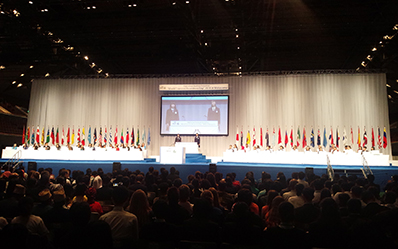(7) Mainstreaming of Disaster Risk Reduction, Measures of Disaster Risk Reduction, and Post-Disaster Recovery and Creating Sustainable Cities
Disasters including earthquakes, tsunamis, typhoons, floods, droughts, and debris flows, that occur frequently around the world do not merely take human lives and property. In developing countries that are vulnerable to disasters, the poor are more likely to be affected significantly and displaced by disasters. In addition, protracted secondary damage such as the deterioration of sanitary conditions and food shortages, can increase the severity of the issue, and have a significant impact on the overall social and economic systems in developing countries. Therefore, it is necessary to build a disaster-resilient and flexible society to protect human lives from disasters as well as to promote the “mainstreaming of disaster risk reduction” aimed at sustainable development, by incorporating disaster risk reduction measures into every phase of every sector of development, based on assumptions of disasters of various scales.
Moreover, in recent years, attention has been focused on the various issues relating to the management of cities, which serve as primary settlement areas of humans and are the focal points of economic, social, and political activities. These issues include the following: measures to handle the disposal of the substantial amount of waste emitted in urban areas and suburbs, prevention of air, water, and other environmental pollution, development of infrastructure facilities including sewage and waste treatment systems, and responses to rapid population increases and the consequent rapid pace of urbanization. Addressing these issues and engaging in efforts to realize sustainable cities have become priorities for development cooperation.
Therefore, among the SDGs, Goal 11 sets forth the following task: “Make cities and human settlements inclusive, safe, resilient and sustainable.” Likewise, there is growing international interest in resolving the issues of human settlements, including realizing sustainable cities.
■Japan’s Efforts
●Cooperation in Disaster Risk Reduction
Japan utilizes its enriched knowledge and technology acquired through its past experiences with natural disasters, such as earthquakes and typhoons, to provide proactive support for disaster risk reduction and post-disaster recovery measures, alongside emergency assistance. In 2015, as a result of the Third UN World Conference on Disaster Risk Reduction held in Sendai City, the Sendai Framework for Disaster Risk Reduction 2015-2030 (Sendai Framework) was adopted. The Sendai Framework incorporated Japan’s stance on the importance of investment in disaster risk reduction, commitments of diverse stakeholders, the concept of “Build Back Better,” the importance of women’s leadership, and the “mainstreaming of disaster risk reduction,” which applies the concept of disaster risk reduction in all development policies and plans.

Opening ceremony of the High School Students Summit on World Tsunami Awareness Day 2018 in Wakayama
Furthermore, Prime Minister Abe announced the Sendai Cooperation Initiative for Disaster Risk Reduction as a new support initiative that would become Japan’s future basic policy for cooperation in the field of disaster risk reduction. Through this initiative, Japan demonstrated its attitude to further contribute to the international community by utilizing its advanced expertise and technology in the field of disaster risk reduction, by announcing the provision of financial cooperation amounting to $4 billion over four years from 2015 to 2018, and training for 40,000 personnel in the area of disaster risk reduction and post-disaster recovery. Such efforts by Japan enhanced not only the quality of building structures and improvement of disaster monitoring facilities in each country, but also the development of human resources for enactment of laws and plans related to disaster risk reduction, formulation of disaster risk reduction policies, and disaster monitoring. Consequently, the mainstreaming of disaster risk reduction is progressing in each country.
At the UN summit that adopted the 2030 Agenda in September 2015, Prime Minister Abe encouraged other countries to set the UN’s World Tsunami Awareness Day in order to raise awareness of tsunami. As a result, a resolution adopted at the UN General Assembly in December the same year, established November 5 as World Tsunami Awareness Day. Accordingly, Japan organized the “High School Students Summit on World Tsunami Awareness Day 2018 in Wakayama” in Wakayama City, Wakayama Prefecture, on October 31 and November 1, 2018.
●Realizing Sustainable Cities
Based on the Development Cooperation Charter, Japan implements initiatives to resolve global issues directly related to human settlements, including efforts for promoting disaster risk reduction, recovery from natural disasters, and a sound water cycle. In particular, drawing on its know-how and experience, Japan develops infrastructure, including water and sewage, waste, and energy facilities. In addition, Japan carries out disaster risk reduction programs, human resources development, etc. based on the concept of “Build Back Better,” striving to build cities that are more resilient to natural disasters after rebuilding. Furthermore, Japan implements initiatives through providing assistance to the United Nations Human Settlements Programme (UN-Habitat), which promotes sustainable urban development. One example can be seen in Japan’s collaboration with the UN-Habitat Regional Office for Asia and the Pacific (ROAP), based in Fukuoka, to introduce the environmental technology of private-sector companies and local governments in Japan to their overseas counterparts.
Moreover, at the Third UN Conference on Housing and Sustainable Urban Development (HABITAT III) held in Quito, Ecuador in South America in 2016, the New Urban Agenda (NUA) was adopted as a policy for international efforts aimed at the solution of issues pertaining to urban problems and human settlements, based on the results of the efforts that each country has undertaken in the area of human settlement. NUA contributes to the achievement of the SDGs including Goal 11, and Japan also intends to advance efforts aimed at the implementation of NUA.
